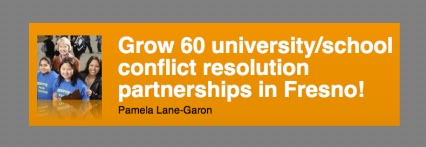The 3rd Edition of our popular wall calendar for teachers and youth workers is being developed now. Promote conflict resolution skills in your learning communities with the full-color 28-page wall calendar covering the school year (August 2011 through July 2012). Each month includes a full page of activities and educator tips to promote conflict resolution. The calendar’s date grid highlights significant holidays, conflict resolution events and peacemaker birthdays. CREducation.org also provides a pdf smartboard-friendly version with live web-links leading to additional information, videos and learning modules.
CRE CALENDAR PRE-ORDER OPPORTUNITY
This announcement flyer serves as your chance to help support conflict resolution in education, gift others in your organization, and promote your own related initiatives. A business card sized space is provided on the back cover of the calendar so donors can paste or stamp a label promoting your organization. Resale of this non-profit calendar is not permitted. Delivery of the print calendars is scheduled for the last week of July.
The cost for advance orders of the 28-page full-color calendars is as follows if you can commit by June 30, 2011.
$2.00 each (on pre-orders of 25 or fewer calendars);
$1.75 each (on pre-orders of 26-100);
$1.50 each (on pre-orders of 100+)
To get a better feel for the product, you can take a look at last year’s calendar online here.




 Through its new
Through its new